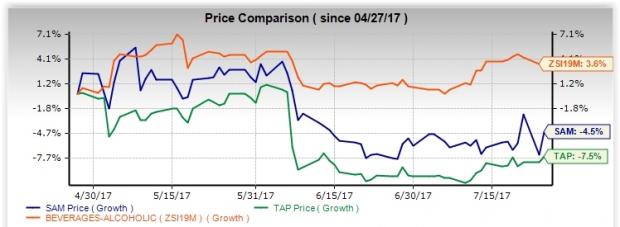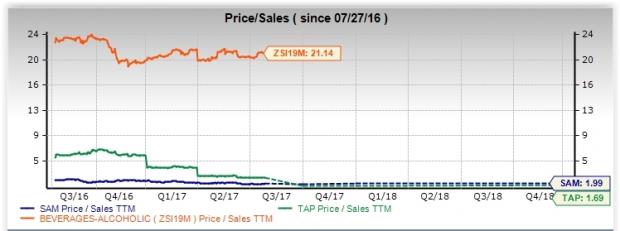According to a recent Gallup poll, beer continues to be the most favored alcoholic beverage in the U.S. The poll conducted early this month reveals that 40% of alcohol consumers prefer beer, compared to 30% who prefer wine and 26% who have voted for liquor. These findings come at a time when it is widely being held that millennials prefer to consumer wine over beer.
The Gallup poll findings clearly show that if this is indeed the case, beer is not going to give up its dominance of the alcoholic beverages space in a hurry. This is a consumer staples category for which demand remains steady regardless of the current economic situation. In this context, earnings of beer companies scheduled for release over this week and the next, including Anheuser-Busch InBev SA/NV (NYSE:BUD) and Diageo (LON:DGE) plc (NYSE:DEO) , assume greater significance.
With The Boston Beer Company, Inc. (NYSE:SAM) scheduled to report on Jul 27 and the Molson Coors Brewing Company (NYSE:TAP) reporting on Aug 2, this may be a good time to consider which of these is a better stock. While Molson Coors has a Zacks Rank #3 (Hold), Boston Beer carries a Zacks Rank #2 (Buy). You can see the complete list of today’s Zacks #1 Rank (Strong Buy) stocks here.
Price Performance
Both Boston Beer and Molson Coors have performed poorly over the last three months, a period during which the Zacks categorized Alcoholic Beverages industry has gained 3.6%. However, while Molson Coors has lost 7.5% over this time period, Boston Beer has only declined by 4.5%, making it the better choice on this count.

Valuation
The price to sales ratio is particularly relevant in a consumer focused industry whose fortunes are dictated by the ebb and flow of sales. This ratio indicates that market value of each of the company’s sales dollars.

Coming to the two stocks under consideration, both are undervalued compared to the wider industry, which has an exorbitant P/S ratio of 21.14. However, Boston Beer is the pricier of the two, since it has a P/S ratio of 1.99, higher than Molson Coor’s reading of 1.69.
Net Margin
Profitability ratios acquire greater importance in an industry characterized by low margins. Net margin is a good metric to compare the profitability of companies within the same industry, since they are bound by the same business constraints.
.jpg)
With a net margin value of 9.8%, Boston Beer is well behind the industry average of 20.5%. However, is better placed on this count compared to Molson Coors, whose value for the metric stands at 8.5%
Debt-to-Equity Ratio
The debt-to-equity ratio is a good indicator of the financial well-being of a company and is a good proxy for its debt servicing capacity. In the context of the beer industry, it is an indicator of the company’s long-term sustainability. Since Boston Beer utilizes a negligible amount of debt, or no bet to fund its operations, it has a debt-to-equity ratio of 0. In contrast, Molson Coor’s debt-to-equity ratio of 104.03 is alarmingly high, which means Boston Beer easily wins this round.

Asset Turnover Ratio
Since the beer industry is essentially characterized by low margins and high volumes, activity ratios are extremely important when determining the health of a company. All activity ratios are geared toward gauging a company’s ability to convert various heads under its balance sheet into sales or cash. The asset turnover ratio examines the level of efficiency with which a company utilizes its assets to conduct sales.

With an asset turnover ratio of 1.45, Boston Beer is comfortably placed with respect to the broader industry, whose value for this metric stands at 0.52. In this context, Molson Coors has an asset turnover ratio of 0.28, which places it at a disadvantage to both the industry and Boston Beer
Quick Ratio
Considered to be a conservative measure of liquidity, the quick ratio gauges as to how liquid the current position of a company is. In other words, it measures the extent to which liquid current assets can service current liabilities. The measure is conservative since it does not take into account current assets which are relatively less liquid such as inventory.

With a quick ratio of 1.21, Boston Beer is better placed compared to the broader industry, whose value for this metric stands at 0.65. Molson Coors is poorly placed on this count since its quick ratio stands at 0.43.
Earnings History and ESP
When considering Earnings ESP, there is nothing to choose from between the two stocks with both having readings of 0. However, taking into account a more comprehensive earnings history, Molson Coors has delivered a positive surprise in only one of the four preceding quarters and has an average earnings surprise of -22.6%. Boston Beer is better on this count, since it has delivered positive earnings surprises in three out of the four prior quarters. Further, it has an average earnings surprise of 30.6%.
Conclusion
Our comparative analysis shows that Molson Coors holds an edge over Boston Beer when considering price-to-sales ratio. But on all other counts Boston Beer has a clear edge. Not only does it have a relatively better price performance and superior earnings history, it is better placed when considering net margin, debt-to-equity, asset turnover and quick ratios. With a better Zacks Rank #2, Boston Beer is clearly placed better than Molson Coors ahead of earnings.
The Hottest Tech Mega-Trend of All
Last year, it generated $8 billion in global revenues. By 2020, it's predicted to blast through the roof to $47 billion. Famed investor Mark Cuban says it will produce "the world's first trillionaires," but that should still leave plenty of money for regular investors who make the right trades early.
See Zacks' 3 Best Stocks to Play This Trend >>
Molson Coors Brewing Company (TAP): Free Stock Analysis Report
Diageo PLC (DEO): Free Stock Analysis Report
Anheuser-Busch Inbev SA (BUD): Free Stock Analysis Report
Boston Beer Company, Inc. (The) (SAM): Free Stock Analysis Report
Original post
Zacks Investment Research
